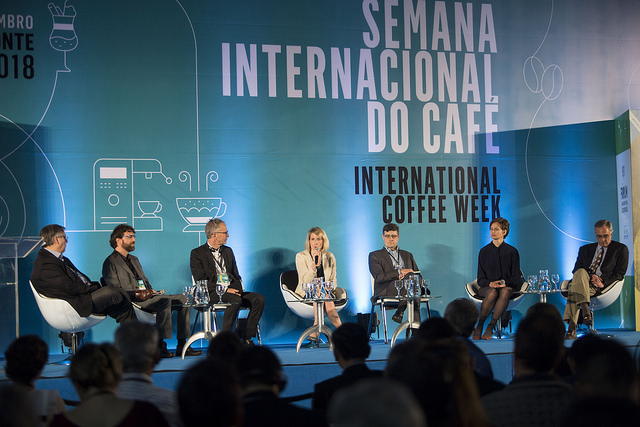Belo Horizonte – The avenues for bringing the ‘sustainability’ hype into the coffee industry were discussed during the Global Coffee Sustainability Conference, this Thursday (8) in Belo Horizonte during the International Coffee Week (ICW). In the panel ‘A shared journey: global collaboration towards a viable coffee industry,’ coffee industry players worldwide discussed problems along this path.
“If you don’t have food to feed your family, there’s no way you’ll think of anything else. Most coffee producers in the world are unable to cover production costs. I’m talking about recent numbers. We must keep in touch with the producers and stay together,” said Juan Esteban Ordúz, who sits on the board of Rainforest Alliance, a major coffee industry certifier. “We must have a serious conversation and discuss economic sustainability. Three years ago, we were discussing sustainability in terms of climate and water issues. Now, we have changed, we are taking the next step. Sustainability in economics, society and natural resources,” Ordúz asserted during the panel.
The Rainforest Alliance’s CEO Han de Groot believes other steps along the production chain need attention. “We are still far removed from this best-case scenario of working together. First and foremost, one must look at another player’s work and recognize that they are doing a better job than me at this point, so let’s get together and learn from one another,” he said.
In a drive to connect different initiatives, the International Coffee Organization (ICO) is working on building partnerships. Ever since Brazil’s José Sette took charge as CEO in 2017, memorandums have been signed into, with the International Women’s Coffee Alliance (IWCA), the Global Coffee Platform, comprising multiple organizations to work for industry sustainability, and the African Fine Coffees Association.
Last September, ICO released a guide on how to get funding from the Global Environment Facility, which finances environment-related projects around the world. “There’s this belief that money is lacking when it comes to supporting initiatives, but that’s not the case. There’s plenty of money to go around, but it often fails to reach the targets because projects do not meet [the requirements]. That is why the ICO is looking to help so projects are ready to get the cash,” Sette told ANBA.
The guide is designed to make it clear to governments affiliated with the organization which initiatives are eligible for financial support, and to show how to outline the best possible projects. “We even cover adapting the language of these projects. We can help countries with structuring them,” the ICO executive said.
*The reported travelled at the invitation of the ICW organizers
Translated by Gabriel Pomerancblum




